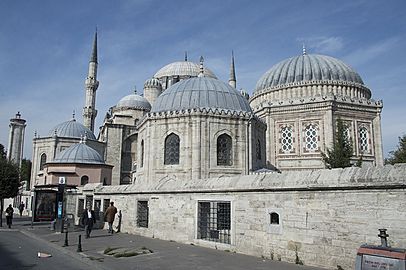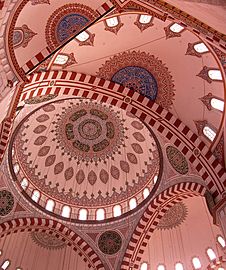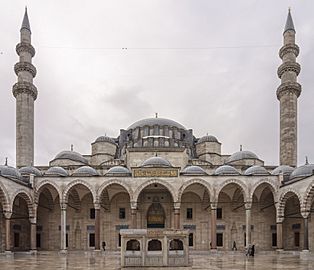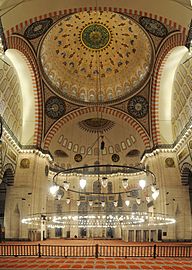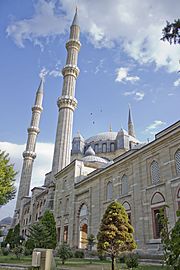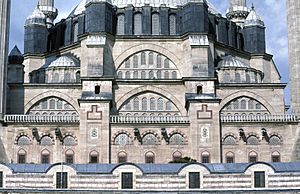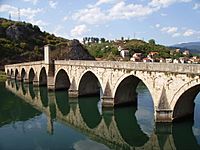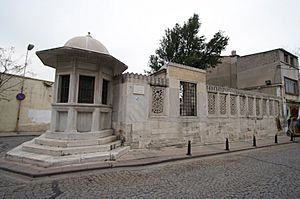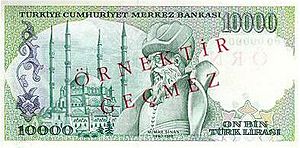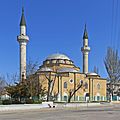Mimar Sinan facts for kids
Quick facts for kids
Mimar Sinan
|
|
|---|---|
Possibly Mimar Sinan (left) at the tomb of Suleiman the Magnificent, 1566 manuscript
|
|
| Born | c. 1488/1490 |
| Died | 17 July 1588 (aged 97–100) |
| Nationality | Ottoman |
| Occupation | Architect |
| Buildings | Süleymaniye Mosque Selimiye Mosque Mehmed Paša Sokolović Bridge Mihrimah Sultan Mosque Mihrimah Mosque Kılıç Ali Pasha Complex Şehzade Mosque Haseki Hürrem Sultan Baths Haseki Sultan Complex Sokollu Mehmet Pasha Mosque Rüstem Pasha Mosque |
| Signature | |
 |
|
Mimar Sinan (born around 1488–1490, died July 17, 1588) was a very important Ottoman architect and engineer. He worked for three different sultans: Suleiman the Magnificent, Selim II, and Murad III. Sinan designed and built over 300 major buildings. These included mosques, bridges, schools, and other public works.
His students later became famous architects themselves. They designed buildings like the Sultan Ahmed Mosque in Istanbul and the Stari Most bridge in Mostar. Sinan is known as the greatest architect of the classical Ottoman period. Some people even compare him to Michelangelo, a famous artist from the same time. Sinan's buildings are among the most influential in history.
Contents
Who Was Mimar Sinan?
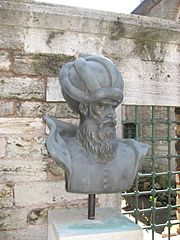
Mimar Sinan was born in a small town called Ağırnas near Kayseri, in what is now Turkey. He was born into a Christian family. His father was a stonemason, and Sinan helped him with his work. This gave him a good start in understanding how buildings are made.
When he was older, Sinan was chosen to join the Ottoman army. This was part of a system called devshirme. He moved to Constantinople (now Istanbul) and became a Muslim. He trained to be an officer in the Janissary Corps. Sinan learned carpentry and math, and soon became an assistant to leading architects. This is how he began his training as an architect.
Sinan's Military Adventures
Sinan's military career helped him become a skilled engineer. He joined many army campaigns. He was with Sultan Selim I and later Sultan Suleiman the Magnificent. He fought in important battles like the Battle of Mohács.
During these campaigns, Sinan showed he was a talented architect and engineer. He built defenses and bridges for the army. For example, he built ships to cross Lake Van during a campaign in Persia. He even helped convert churches into mosques. Because of his skills, he was given the special title of Haseki'i. This meant he was a sergeant in the Sultan's bodyguard.
In 1539, Sinan became the Chief Architect of the Ottoman Empire. This was a huge job. He was in charge of all building projects across the empire. This included roads, water systems, and bridges. He led a large team of architects and assistants. He held this important position for almost 50 years.
Sinan's Amazing Buildings
Sinan's experience as an army engineer gave him a practical way of building. He designed at least 374 structures. These included 92 mosques, 52 smaller mosques, 55 schools, 20 mausoleums, and many other public buildings. He oversaw all construction work in the Ottoman Empire.
His career can be seen in three main stages, shown by three of his greatest works:
- The Şehzade Mosque in Istanbul (his "apprenticeship" work).
- The Süleymaniye Mosque in Istanbul (his "qualification" work).
- The Selimiye Mosque in Edirne (his "masterpiece").
- Sinan's major works
-
Süleymaniye Mosque in Istanbul
Early Works: Learning and Growing
Sinan's first big project as royal architect was the Haseki Sultan Complex. He also built the Iskele Mosque in Üsküdar. This mosque already showed signs of his future style. It had a large, high main space and tall, thin minarets.
The Şehzade Mosque was built in memory of Sultan Suleiman's son. Sinan designed it with a large central dome and four equal half-domes. This was a new and impressive design for its time.
Middle Period: Becoming a Master
Around 1550, Sultan Suleiman asked Sinan to build his own imperial mosque, the Süleymaniye Mosque. This was a massive project. Sinan and his team finished it in seven years. The Süleymaniye Mosque is one of Istanbul's most famous landmarks. Sinan wanted to create the largest space possible under a single central dome. He used clever geometry to make the building look perfect and harmonious.
During this time, Sinan also designed many other buildings. He built the Sinan Pasha Mosque and the Kara Ahmet Pasha Mosque. He also built the beautiful Haseki Hürrem Sultan Hamamı, a public bathhouse.
The Mihrimah Mosque at Edirnekapı is another amazing work from this period. Sinan built it on top of a hill. It has a huge central dome, 37 meters (121 feet) high. Many windows fill the inside with light, making it feel open and bright.
Masterpiece: Selimiye Mosque
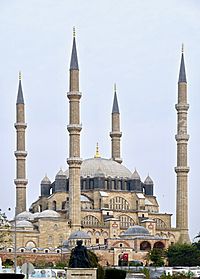
Sinan considered the Selimiye Mosque in Edirne his greatest work. He was over 80 years old when it was finished! He wanted to create a perfect, unified space under a single dome. The dome is 31.28 meters (102 feet) wide and 42 meters (138 feet) high. It is supported by eight huge marble and granite pillars. The inside is filled with light from many windows. The four minarets are 83 meters (272 feet) tall, making them the tallest in the Muslim world. They make the mosque look even more grand.
Sinan also designed many impressive bridges. The Mehmed Paša Sokolović Bridge in Višegrad, Bosnia and Herzegovina, is a famous example. It is now a UNESCO World Heritage Site. He also built aqueducts to bring water to Istanbul, like the Mağlova Arch.
Sinan's Legacy
Sinan changed Ottoman architecture. Before him, buildings were often simple copies of older designs. Sinan brought new ideas and tried to make every building perfect. He focused on creating clear, unified spaces. He used clever ways to support domes and fill interiors with light. He also made sure his mosques were part of a larger complex, serving the community with schools, hospitals, and public kitchens.
When Sinan died, Ottoman architecture reached its highest point. No one after him could quite match the brilliance of his designs. His students followed his ideas, but the same level of new invention faded.
Sinan's Many Constructions
During his nearly 50 years as chief architect, Sinan was responsible for building or supervising 476 structures. About 196 of these still exist today. While he couldn't design every single one himself, he led a large team and took responsibility for all their work.
Here are some types of buildings he oversaw:
- 94 large mosques
- 57 colleges
- 52 smaller mosques
- 48 bath-houses
- 35 palaces
- 22 mausoleums
- 20 caravanserais (inns for travelers)
- 17 public kitchens
- 8 bridges
- 6 aqueducts
- 3 hospitals
Some of his famous works include:
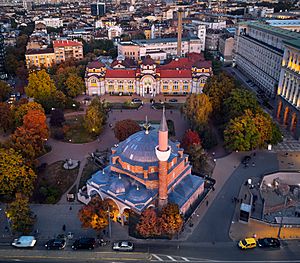
- Sokollu Mehmed Pasha Mosque (Azapkapı)
- Selimiye Mosque in Edirne
- Süleymaniye Mosque
- Kılıç Ali Pasha Complex
- Haseki Baths
- Şehzade Mosque
- Mihrimah Sultan Mosque in Edirnekapı
- Mihrimah Sultan Mosque in Üsküdar
- Mehmed Paša Sokolović Bridge in Višegrad, Bosnia and Herzegovina
- Banya Bashi Mosque in Sofia, Bulgaria
- Rüstem Pasha Mosque
- Sulaymaniyya Takiyya in Damascus, Syria
Death and Lasting Fame
Mimar Sinan died in 1588. He is buried in a tomb he designed himself, near the Süleymaniye Mosque in Istanbul. His tomb is close to the tombs of his important patrons, Sultan Suleiman I and his wife, Haseki Hürrem.
Sinan's name lives on in many ways:
- There is a crater on the planet Mercury named after him.
- A Turkish state university, the Mimar Sinan Fine Arts University, is named in his honor.
- His portrait was on Turkish banknotes and coins.
- He has been featured on postage stamps.
- He is a character in the novel The Architect's Apprentice by Elif Shafak.
Images for kids
-
Osman Shah Mosque in Trikala, Greece
-
Mimar Sinan's architectural concepts were incorporated into the design of the Taj Mahal, in the Mughal Empire by Shah Jahan.
 In Spanish: Sinan para niños
In Spanish: Sinan para niños
- Isa Muhammad Effendi
- Sedefkar Mehmed Agha
- Atik Sinan
- Mimar Hayruddin
 | Kyle Baker |
 | Joseph Yoakum |
 | Laura Wheeler Waring |
 | Henry Ossawa Tanner |


